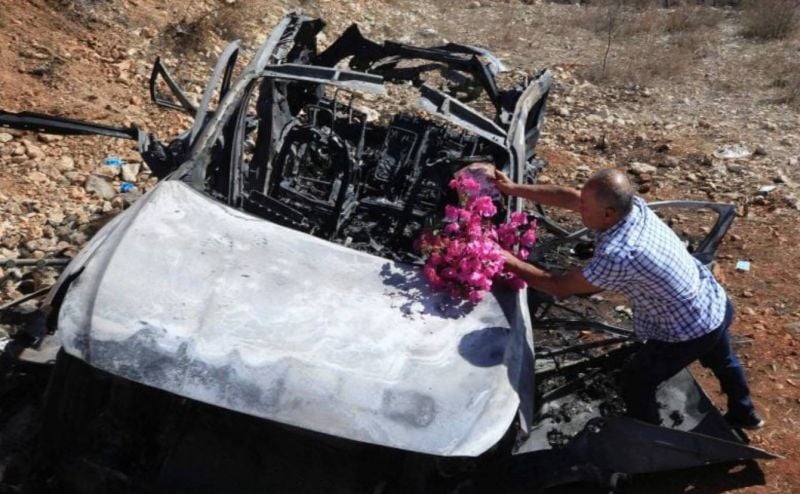
Samir Ayoub places flowers on the vehicle targeted by an Israeli strike that took the lives of his three nieces in South Lebanon, Nov. 6 (Credit: AFP)
“Remas was like a sister to me,” said Chirine Ibrahim, a 14-year-old who fondly reminisced about welcoming her classmate into her home in Ainata, a village in southern Lebanon, just six kilometers from the Israeli border.
“We used to go for walks together or hang out with our group of friends,” Ibrahim recalled.
Remas would also frequent a friend’s home in Blida, a village adjacent to the Blue Line, nine kilometers further east.
“In their garden, Remas and her sisters had planted fruit trees and they had adopted a few small cats, which they sometimes allowed inside the house,” Ibrahim recalled.
On Sunday, Remas Mahmoud Chour, 14, her sisters Taleen, 12, and Layan, 10, and their grandmother Samira Abdel Hussein Ayoub were killed by an Israeli drone strike that targeted their vehicle on the road between Aitaroun and Ain Ebel.
Their mother Hoda Hijazi, who was driving when the shell hit the car, is currently being treated in the Ragheb Harb hospital in Nabatieh, where according to Chirine’s mother Zeinab Ibrahim, “she is undergoing surgery.”
“There have been strikes for several weeks in the area,” Zeinab Ibrahim said. “But I would never have imagined that they would target young girls, mere schoolgirls.”
Lebanon has officially filed a complaint with the UN Security Council regarding the “killing of children and civilians” by Israel in southern Lebanon, as declared by caretaker Lebanese Foreign Minister Abdallah Bou Habib in a statement on Monday.
As reported by the Israeli newspaper Haaretz on Monday, Hezbollah launched an anti-tank missile near Kibbutz Yiftach on Sunday afternoon, killing a civilian who was driving a water tanker.
“In response, an Israeli army drone targeted a vehicle on the Lebanese side of the border,” Haaretz reported, further suggesting that there may have been an error in identifying the source of the anti-tank missile that killed the civilian.
Since hostilities along Lebanon’s southern border commenced after Hamas’ surprise attack on Oct. 7, the residents of the surrounding villages have been living through a harrowing ordeal.
“What we’re enduring in Ain Ebel is unbearable,” said Sister Maya Beaino, the head of Saint-Joseph des Saints-Cœurs School in the predominantly Christian village, where the three children killed on Saturday studied for three years. “The bombings are drawing closer, often depriving us of sleep.”
“These girls were like part of our family. With their tragic, ruthless and brutal deaths, it’s difficult to find the words to describe this Israeli act,” Beaino said. “We are filled with sorrow, shock, and grief.”
The funeral arrangements have not yet been announced, as the mother is hospitalized, while the father, Mahmoud Hijazi, is expected to arrive in Beirut on Monday night. He is on his way from Abidjan, where he works in interior design, said Zainab Ibrahim.
‘Lebanon was their paradise’
The three young girls returned to Lebanon three years ago from Côte d’Ivoire.
“We provided them with a great deal of guidance and support, particularly as they grappled with the Arabic language,” Beaino said.
“I never teased Remas for her Arabic. Instead, I provided her with significant assistance,” Ibrahim remembered, adding that her friend told her she preferred Lebanon to Côte d’Ivoire because “here, she was able to make many more friends.”
“For them, Lebanon was a paradise,” said Samir Ayoub, the uncle of the three girls. Ayoub, who Lives in Russia, where he works with several Arabic-language media, including Sawt al-Chaab and al-Mayadeen, returned to Aunata a month ago to follow the conflict between Israel and Hezbollah and look after his parents.
He spent that fateful Sunday with the girls and their mother in Blida.
“They were in Hoda’s car and I was in mine,” Ayoub recalled. “In Blida, the girls had packed up their school things to move temporarily to Beirut to continue their education after the school in Ain Ebel had closed,” he explained.
“Unfortunately, the missile arrived at them first. The Zionist enemy targets children here, just as it does in Gaza.”
Speaking to al-Jadeed television on Monday, with his shirt stained with the blood of his nieces, Ayoub said he asked the girls to play next to the car before they set off, because an Israeli drone was flying over them.
“Why this strike? They knew that there were only women and children in the car,” he said, adding that he was ready to accompany “any investigative committee wanting to examine the cars and the site of the strike to check if there was any military presence.”
Contacted by L’Orient-Le Jour, UNIFIL spokesman Andrea Tenenti said “The risk of escalation and loss of control over the situation is evident and must be prevented.”
Indeed, in line with the new tit-for-tat “civilian-for-civilian” strategy outlined by Hezbollah leader Hassan Nasrallah in his speech on Friday, the party promptly announced that it launched Katyusha rockets at Kiryat Shmona in northern Israel as a response to this “barbaric act.”
In Ain Ebel, Beaino harbors one overriding fear: “The possibility of combatants entering our village and firing from here, potentially triggering a chain reaction from Israel.”
This article was originally published in French in L'Orient-Le Jour. Translation by Joelle El Khoury.